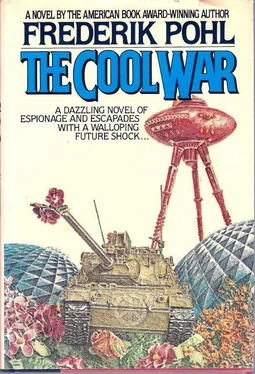“No. Why?” asked Hake. “You still have to take us south.”
“But if you pay me here with your credit card it will be in the sheik’s currency, which is tied to the Swiss franc. Besides, how do I know you will not go off without paying?”
“Well—” said Hake, annoyed, but Alys Brant moved in between them.
“Not a chance,” she said firmly, and tugged Hake into the van. “Oh, Horny,” she sighed, settling herself, “you do let people impose on you. You must have a lot of personal charm, why else would I have let you talk me into this crazy scheme?”
With an effort, he didn’t answer. He clamped his jaw and stared out of the van window. There was not much traffic apart from themselves—none at all to pass, except for a huge machine that looked like a snow-removal truck but turned out to be a sand-sweeper. But the wide road was banked like an autostrada. If it was not used often, at least it was used when drivers wanted to go fast. And as they passed one of the walled compounds, borne on the hot wind through the open windows of the hotel van, Hake heard what sounded like rushing water. A waterfall? How preposterous, in the middle of the Empty Quarter!
How formidable, too. He was surrounded by evidences of wealth and power, and who was he to oppose them? Not to mention that formidable power he worked for, with whom he would sooner or later have to reckon.
“Ahlan wa-sahlan,” said the formally dressed clerk at the registration desk, offering a pen.
“Inshallah ,” responded Hake politely. He signed in, one eye on the signature on his passport to make sure he had it right, and they were conducted to their suite. They had three bellmen to carry their four small pieces of luggage— “I must do some shopping,” Alys whispered in the elevator —and all of them fussed about, opening and closing drapes, trying gold-plated taps in the bath, adjusting the air-conditioners until Hake handed them each a flfty-riyal coin. He closed the door behind them, stood thoughtfully for a moment, and then began to rummage in bureau drawers until he found, first, a copy of the Q’ran, and then what he was looking for: a leather-bound, gold-stamped little volume that was the telephone directory for Abu Magnah. The curlicued script was easy enough to read, surfacing in his mind out of childhood memories as he needed it. But he wasn’t actually reading it. He didn’t exactly know what he was looking for, and what he was mostly seeing was the tenuousness of his plans. 1, go to Abu Magnah. 2, rescue Leota. 3, figure out what to do next. Even as an overall strategic intention it lacked focus. And tactically… where did one begin with step 2? The rescue had seemed even possible, back in Long Branch, as if all he would have to do was go to the local police station and report a kidnapping. But in this oasis town, fiefdom of Hassabou and his relatives, that was not even a hope.
Alys emerged from the bathroom, smiled at him and began to unpack: her cosmetics in a row on the mirrored dressing table, her toiletries in the bath, her clothes in the top drawers of the largest chest. “If you’ll give me one of your credit cards,” she said, “I’ll get whatever else I need this afternoon. You can put your own stuff in that other bureau.”
“Don’t get settled in,” he said. “We’re only going to be here three days at most.”
“But we might as well be comfortable while we’re here. Don’t worry, Horny. I can whisk all this stuff back in the bags in two minutes—after you figure out what we’re going to do, I mean.”
“Fine.” He got up and gazed out the window. Hot as it was, the streets were full of people, a League of Nations of the Arab world. Some of them might help, mightn’t they? A little baksheesh, a clever play on old blood feuds—he could see Jordanians and Yemenis, even an Ait Haddibou Berber in white burnoose and headdress. All he had to do was figure the right ones to approach. His previous experience as a spy-saboteur was not much help; it had led him to a sort of James Bond conviction that somewhere along the road from the airport, or in the lobby of the hotel, some swarthy Levantine merchant or deferential tiny Anna-mese sailor would beg a ride, or ask for a light, and turn out to be an ally. It had not worked out that way. He was on his own.
“What’s this stuff, Horny?” Alys had finished her own unpacking and started on his. She was investigating the jumble at the bottom of the bag, lock pick and electronic teasers, code books, the rest of Art’s tapes, a stiletto.
“Tools of the trade. Just leave them.”
She sighed with pleasure. “You do lead a fascinating life.” She put them in a drawer, hung up his shirts and sat down to regard him brightly. “Let me see,” she said. “Since you’re the expert spy, I’m sure you’ve got a plan all worked out for what we’re going to do next but, just for practice, let me see if I can figure it out. Since we’re pretending to be tourists, we’d better tour. We can look this place over, and that way we can see how to get at Leota. They must have some nice picture postcards in the lobby. Maybe a map. I’ll bet we can piece together quite a lot of information, just by sightseeing and so on. And then, by tonight, we’ll be in a position to make a plan. Am I right?”
Hake studied her innocent face for a moment, then grinned. “My very thoughts,” he said. “Let’s go.”
Where the two wings of the hotel joined, the architect had placed a revolving roof dining room. They ate in the turret that night, and as the restaurant turned Hake could see the sheik’s palace, floodlit in pink and blue under the bright desert night sky. Now that they had seen it close at hand, it looked more formidable than ever. ,. but maybe, Hake thought, he was just tired.
It had been a tiring day. Alys had found postcards and maps easily enough. After ten fruitless minutes talking about tour buses with the concierge—none of them went to the right places, and Hake could not find a way of explaining what the right places were without giving away more than he wished—they had walked out the hotel door and been besieged by taxi drivers, thrilled with the notion of being hired for an afternoon’s sightseeing. Hake picked a displaced Moslem Armenian named Dicran (least likely to notice anything strange about his Arabic, while he was still practicing it), and they had driven around for three hours. Dicran’s over-the-shoulder commentary was a gloss of what he considered the romantic and strange—white Mughathir camels swinging along, ridden by the local police; mosques for Sunni, Shiite and Alawaite Moslems, churches for Druses, Dervishes and, yes, even Christians. And he had been proud to show them Sheik Hassabou’s palace on request. They drove along the farm highway that ran past its walls, and Dicran confided in them, smirking, about the electrified fences inside what looked like green hedges around the harem. Not to mention infrared alarms and armed guards at all the entrances. He had insisted they visit an aipursuq —Hake had puzzled over the word for a while, then laughed as he recognized “supermarket”—to buy local cucumbers, pomegranates and figs, and they had picnicked on real grass, just across the road from the palace itself. Dicran had been a mine of information. But, when you put it all together, how much closer were they to rescuing Leota? Or even to making a plan?
Not much.
But here, in public, with the headwaiter bringing them immense old-fashioned menus, they couldn’t talk about it anyway. And there was always the chance he would think of something. As the waiter strolled gracefully away Alys giggled and leaned closer to Hake. “He’s wearing eye shadow!” she hissed. -
“That’s kohl, Alys. It doesn’t mean he’s gay. They need it to protect their eyes from the sun.”
Читать дальше












